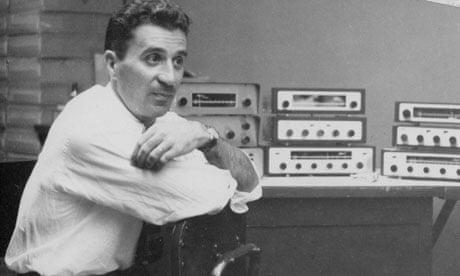Sidney Harman, who has died aged 92 after suffering complications from leukaemia, was the audio pioneer who took stereo music into American homes. A laurelled career in US public life followed, and was topped last year with the purchase of the magazine Newsweek from its parent company, the Washington Post.
Harman entered into partnership with Barry Diller, chairman of IAC, owner of some 50 internet companies worldwide, to merge the Daily Beast website into a new company, the Newsweek Daily Beast Co. Tina Brown, founder and editor of the Daily Beast, became editor-in-chief.
The merger capped a business career that spanned more than 50 years and was marked by innovation, public service, personal philanthropy and a belief that doing business involved more than making money.
Harman argued in his autobiography, Mind Your Own Business: A Maverick's Guide to Business, Leadership and Life (2003), that business life should be informed by personal values and a moral compass. He was critical of "Master of the Universe" management styles. In his memoir, the Montreal-born Harman told the story of growing up in a Jewish family in New York City, his physics degree at City College and his early career working for a New York firm manufacturing public address sound systems. His boss, Bernie Kardon, was the chief engineer. Frustrated at the conservative management, in 1953 Harman and Kardon resigned, putting $5,000 each into a new company to manufacture home sound systems.
The three-tube AC/DC radio in US living rooms in the early 1950s was large, but with limited quality. Harman Kardon integrated the clumsy system of amplifier, preamplifier and speakers into a single package, and made high-fidelity sound part of American life. Harman bought his partner's stake in 1956, retaining his name for the corporation. Two years later, Harman Kardon introduced the first stereo receiver, the Festival TA230. Life on US college campuses was never the same.
The company was merged in 1962 with a cable television company. It was not a happy deal, and Harman sold his share in the company, only to buy the company back in a series of aggressive acquisitions that transformed it into an influential conglomerate. In the late 1960s Harman Kardon introduced the audio noise-reduction system developed by Dolby Laboratories.
An advocate of enlightened labour relations at Harman Kardon plants, Harman caught the eye of President Jimmy Carter, who in 1977 appointed him under-secretary of commerce. While working in Washington he met and married his second wife, Jane Lakes, who was also working in the Carter administration. Jane Harman went on to serve as Democratic congresswoman for the 36th District in California, representing coastal communities in Los Angeles county.
When Sidney took up his appointment in Washington, he sold Harman International to Beatrice Foods for $100m. In 1980, when he left public life, he bought the company back, but new technologies of the 1980s had made the hi-fi and stereo of the classic Harman Kardon products old-fashioned, and the company's adjustment to digital technologies was unsure. A failed sale in 2007 to private equity buyers, led by KKR and Goldman Sachs, led to Harman's retirement a year later, at the age of 89.
He held the Judge Robert Widney chair in business at the University of Southern California, was a fellow of the American Academy of Arts and Sciences, co-authored Starting with the People (1988), on the search for a new national consensus, with Daniel Yankelovich, and donated $20m to support the Harman Centre for the Arts in Washington. Harman was a generous supporter of the Folger Shakespeare Library and the Aspen Institute, and funded the Program on Technology, Public Policy and Human Development at Harvard University.
Harman's family will continue to support Newsweek Daily Beast Co. He is survived by Jane; by their children, Daniel and Justine; by four children, Lynn, Gina, Paul and Barbara, from his first marriage, to Sylvia Stern, which ended in divorce; and by 10 grandchildren.
